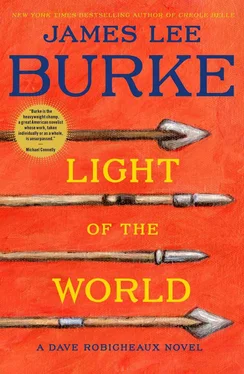She was sitting at the table, her long legs propped on a chair, reading a copy of People, a cup of Starbucks coffee in her hand. “What are you doing in my house?” he said.
“I didn’t want to wake you, so I let myself in,” Gretchen said.
“My door was dead-bolted.”
“It was dead-bolted until I got a coat hanger on it. Dave Robicheaux told me about the three guys who attacked you and your friend. How is she doing?”
“She’s home.”
“That’s not what I asked.”
“They messed up her head proper.”
“You recognized a tattoo on one guy’s hand?”
He sat down across from her and stretched out one leg. “His glove slipped. I couldn’t hear his voice good inside the mask, but I saw the tattoo, and I knew where I’d seen it before.”
She waited for him to continue, but he didn’t. “You look a little hobbled up,” she said.
“It was a red spider. The gardener at Love Younger’s place had one like it. What are you aiming to do, Miss Gretchen?”
“Cook their hash, hon. Want to come along?” she said.
The saloon on North Higgins, down by the old train station, had been through a number of incarnations. For decades it was a brightly lit low-bottom watering hole where workingmen and terminal alcoholics could shoot pool and play pinochle and drink pitcher beer and bulk wine and whiskey at prices that had no peer, except for the Oxford down the street, which in the 1960s charged only five cents for a glass of beer. Academic writers and flower children tried to appropriate the saloon, but their presence was transitory and cosmetic, and the core clientele remained the same — old-time bindle stiffs, gandy dancers, marginal criminals, pullers of the green chain, reservation Indians who drank up their government checks on the fourth day of the month, gypo loggers, miners from Butte and furnace stokers from Anaconda, used-up prostitutes, and the biggest group of all, one that has no categorical name other than the people for whom the phrase “born to lose” was an anthem and not an apology.
Over a long period of time, the photographs of these people were taken by an eccentric and enormously talented daytime bartender named Lee Nye, who framed and hung them on the wall in rows down the length of the saloon. By the 1990s almost all of these Depression-era people were dead and forgotten. The ownership changed and the tobacco-stained floors were replaced, the restrooms painted and remodeled, and a small restaurant was installed in back. The saloon became a cheerful and crowded place in the evenings, full of laughter and free of smoke and worry about privation and disease and mortality.
The photographs of the men and women in tattered clothes remained, their toothless mouths collapsed, their faces wrinkled with hundreds of tiny lines, their recessed eyes containing a strange kind of radiance, as though they wanted to tell us a secret they’d never had a chance to share.
On Sunday evening a man riding a new white Harley flanged with polished chrome drove up the alley behind the saloon and parked next to the brick wall and entered through the back door. The man’s name was Tony Zappa. His eyes were pale and elongated, his hair braided in cornrows. He had the flat chest of a boxer and sun-browned skin as tight as latex on his frame. He did not pay attention to a chopped-down pickup truck with twin Hollywood mufflers that passed the alley and pulled to the curb just beyond the lee of the building.
A few minutes later, Gretchen Horowitz entered the saloon through the front door and went to the bar and stood next to Tony and ordered a beer. She put one foot on the brass rail and looked up at the flat-screen television on the wall. “You ever been in New Orleans?” she said.
“You talking to me?” Zappa said.
“Did you know that was Robert De Niro’s most famous line? It’s from Taxi Driver .”
“You saying I’m copying Robert De Niro?”
“No, I asked if you’d ever been in New Orleans.”
“I’m from Compton by way of Carson City. Know what I mean?”
“Not exactly.”
“Compton is where you go if hell is overcrowded.”
“Wednesday night is yuppie night in New Orleans,” she said. “That’s what this place reminds me of, except tonight is Sunday.”
“You don’t sound like you’re from New Orleans.”
“What do people from New Orleans sound like?”
“Part Italian, part boon, although I hear a lot of the boons got washed out during Katrina,” he said. “You want a shot to go with that beer?”
“Long day, boss. Another time.” Her attention seemed to fade. She yawned and looked up at the television screen.
“I say something wrong?”
“No, I need to get something to eat.”
“I bet you wear contacts.”
“You’re going to tell me something about my eyes?”
“They’re violet. You got reddish hair with violet eyes. It’s not something you see every day.”
“I was conceived in an in vitro dish. The male donor was a package of purple Kool-Aid.”
“That’s pretty good.”
“You took a slide on your bike?”
He gazed at her, puzzled.
“The bruises on your arms and neck. I saw you on Higgins a little while ago. You were riding a white Harley.”
“You were looking at me?”
“What’s the spider on your hand mean?”
“You know what Compton is like if you’re white or Hispanic?”
“You’re lunch meat?”
“Ever hear of the Arañas?”
“No.”
“That was our gang, the Spiders. We had one rule and one rule only, and all the Crips and Bloods knew what it was: Anything they did to one of us, we did to ten of them. If a cannibal got caught in the wrong apartment building, he got a free flight off the roof.”
“You look a little hyper.”
“I consider myself pretty mellow.”
“You get into it with somebody?”
“No. Why you asking?”
“Because you’re agitated and because I saw something outside.”
“Where you come from, people talk in code?”
She finished her beer and stared into space as though coming to a decision. “I don’t like to mind other people’s business, but you seem like a nice guy. That’s your Harley in back, right?”
“What about it?” he said.
“When I walked past the alley, there was a guy out there.”
“Which guy? What are you talking about?”
“A guy. He was dressed like a cowboy.”
“What was he doing?”
“Looking at your hog.”
“Who cares?”
“He squatted down like he was examining the engine, like it was his hog.”
“Did this guy look like he’s part white, part Indian? Or more like a white Indian?”
“His Wranglers were splitting on his ass. He was wearing a straw cowboy hat. A white Indian?”
“He had a limp, maybe?”
“I didn’t stick around to see. Maybe I shouldn’t have said anything.”
“You wait here.”
“I didn’t get that.”
“Wait here. I’ll be back.”
“How about it on the attitude?”
“I want to buy you a drink or dinner. Don’t go anywhere. That’s all I was saying, for Christ’s sake.”
Tony Zappa went out the back and returned in under five minutes. He was grinning and obviously feeling good and ready to resume the conversation. “No problem. I cranked it up. It’s fine. You had me going there. How about that drink now?”
“No, thanks.”
He seemed to reevaluate, as though he couldn’t free himself of a self-centered fear that had probably governed his thoughts for a lifetime. “One last try. Was there anything different about this guy? Did he have weird-looking eyes, maybe a cut on his head?”
“He looked like a cowboy. I told you. You get into it with somebody?”
Читать дальше












